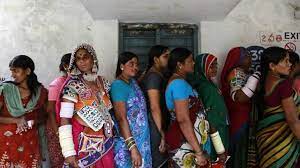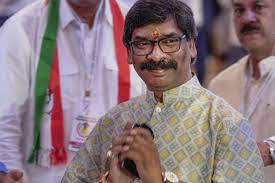Before the assembly elections, a look at OBC candidates as caste politics take center stage
Many people see the impending Assembly elections in Madhya Pradesh, Chhattisgarh, Rajasthan, Mizoram, and Telangana as a prelude to the general elections that will take place in the following year. Furthermore, caste has been the primary focus of almost all election campaigns after the Nitish Kumar administration of Bihar’s successful caste census.
The outcome of the November elections will determine the overall political trend in the Hindi heartland and the preferences of the voters for the next year, which puts the Bharatiya Janata Party (BJP) and Congress in the greatest position to gain. The Congress Working Committee (CWC) convened on October 10 and said that the party will carry out a caste census throughout the country and eliminate the fifty percent quota ceiling for scheduled castes, scheduled tribes, and other backward classes if voted to power.
The BJP wants to gain support from the non-dominant OBCs, who make up a higher portion of the backward castes while having smaller individual numbers than the dominant OBCs like the Yadavs, on whom Congress principally depends.
Madhya Pradesh
Although the party has not yet released its list, the Congress has declared that 40% of the 230 seats in the Madhya Pradesh legislature would go to candidates who identify as OBC. Two lists totaling 229 candidates have been issued by the party, with 62 (or 27%) falling under the OBC category. On the other hand, the BJP hopes to improve on its 2018 percentage of 39% by fielding 40 OBC candidates, or 29% of the total stated list.
Party leader Damodar Singh Yadav, the state head of the Congress’ OBC section, stopped denouncing Digvijaya Singh of granting less seats to the backward classes in response to the publication of the Congress’ second list. Yadav had demanded 126 seats. Additionally, he charged Singh of favoring his son, the MLA.
Conversely, the BJP’s election successes since 2003 have been largely attributed to the unwavering support it has gotten from OBCs, who make up more than half of the state’s population. Not to be forgotten, even though he is now playing catch-up, the current chief minister, Shivraj Singh Chouhan, served as the party’s OBC mascot for the three assembly elections in 2008, 2013, and 2018.
Before then, two previous BJP chief ministers of Madhya Pradesh, Uma Bharti and Babulal Gaur (Yadav), were also OBCs. Although the Congress has been advocating for the underprivileged, it is not supported by powerful leaders from the OBC. Nonetheless, with Kamal Nath returning as the CM face, it is optimistic about winning the MP votes.
Telangana
With an emphasis on the OBC vote bank, the BJP is preparing for a direct challenge to the incumbent Bharatiya Rashtra Samithi (BRS) in Telangana. In Telangana, the BJP has a number of influential OBC leaders, including five-time Huzurabad MLA Eatala Rajender, former state BJP president Bandi Sanjay, and Laxman, the chairman of the national OBC Morcha.
In order to get an advantage over the Congress and create the precedent for the Lok Sabha elections, rumors suggest that the central leadership of the BJP is also thinking of declaring an OBC face as the chief ministerial candidate for the next elections.
Meanwhile, the Congress’s proposal for a national caste census has put it in a delicate position in Telangana. The OBC leaders are putting a lot of pressure on the party as it tries to find the winning faces because they want a piece of the party tickets.
However, K Chandrasekhar Rao, the chief minister and president of BRS, is focused on the organization’s growth plans. Only 22 tickets have been granted to OBC candidates this time, despite the party depending on Dalit votes in the last two elections. BRS has also come under fire for failing to carry out its flagship BC Bandhu and Dalit Bandhu programs to the fullest extent possible.
Chhattisgarh
Until Chief Minister Bhupesh Baghel—a Congress poster child for the lower classes—brought OBC problems to the fore, Chhattisgarh politics were mostly focused on either upper castes or tribes. As a member of the OBC Kurmi group, Baghel has always been proud of his caste identity, which has made him relatable to the general public.
In an attempt to reclaim land lost to it, the BJP is now making inroads in the state. Due in large part to Baghel’s performance, the BJP selected an OBC, Arun Sao, as party chairman, replacing tribal leader Vishnu Deo Sai. To win over Sahu supporters, the party has also nominated Ishwar Sahu, the father of Bhuneshwar Sahu, a casualty of the incident.
In an attempt to capitalize on Baghel’s popular support, Congress fielded 29 OBC candidates on its lists for the 90-seat assembly this year. Out of the 85 candidates, the BJP has nominated 29 OBC candidates; the party has not yet announced candidates for the other five seats.
Rajasthan
Following years of squabbling between chief minister Ashok Gehlot and his former deputy, Sachin Pilot, who commands a sizable voting base among the younger demographic, Rajasthan Congress has expressed doubt about winning Rajasthan this time. However, if the Gehlot administration is re-elected, it has also promised to conduct a caste survey similar to the Bihar census. Will it, however, aid in preserving the Congress’ winning streak?
This would be Rajasthan’s first caste survey, if it were carried out. Dalits make up 17.8% of Rajasthan’s population, while Adivasis make up 13.5%, according to the 2011 census. According to CSDS polls conducted for the elections in 2013 and 2018, OBCs make up around 35–40% of the state’s population. With the exception of certain areas, the largest community—the Jats—who make up around 10–12% of the population, also come under the OBC group.
However, it is said that since 1999, Jat politicians have been marginalized by Ashok Gehlot. BJP officials, like as Vasundhara Raje, who married into a Jat royal family, have seen this as a benefit for the saffron party.
Gehlot has also infuriated the Gujjar people, another OBC tribe, by marginalizing Sachin Pilot, a key Gujjar face for the party. The caste census has angered the Brahmin support base of the Congress, who may now be inclined towards the BJP, even though it would greatly benefit the state’s OBC group.
Mizoram
The majority of the Scheduled Caste and Scheduled Tribe populations of Mizoram make up the biggest tribal population in the nation. However, the Mandal Commission report states that the Gorkhas in the state have been fighting for recognition as an OBC for a long time. Due to the government’s stepmotherly behavior, the topic has previously come up during assembly elections, when Gorkhas have threatened to vote “NOTA.” This time, however, it seems that the caste problem is not as much of an influence on the impending elections as the current situation in Manipur.
The Mizo National Front (MNF), headed by Zoramthanga since 2018, has been the dominant party in Mizoram since the state’s inception. The Congress has been the other contender in this two-party system. MNF, an ally of the NDA at the Centre and a constituent of the BJP-led North East Democratic Alliance (NEDA), has alluded to a schism because of the violence against Christians, the state’s main group, in neighboring Manipur.
Chief Minister Zoramthanga said on Monday that when Prime Minister Narendra Modi comes to the state to campaign for elections, he would not share the platform with him. “Everyone in Mizoram is a Christian. The Mizos were vehemently opposed to the proposal when the Meities set fire to hundreds of churches in Manipur. It would be a major negative for my party to show sympathy for the BJP at this moment, Zoramthanga told the BBC in an interview.
He emphasized that in order for people to return to their home state, the Center must bring peace back to Manipur, which has been rocked by ethnic strife.
The ECI stated in a news conference on October 10 that voting in the five states will start on November 7 and last until November 30. Mizoram will cast ballots on November 7, while Chhattisgarh will hold elections in two stages on November 7 and November 17. Since the election is scheduled on a Sunday and would conflict with religious activities, Mizoram has requested a change in date. November 17, November 25, and November 30, respectively, will see a single phase of elections in Madhya Pradesh, Rajasthan, and Telangana.
December 3 is when the votes are supposed to be counted.







